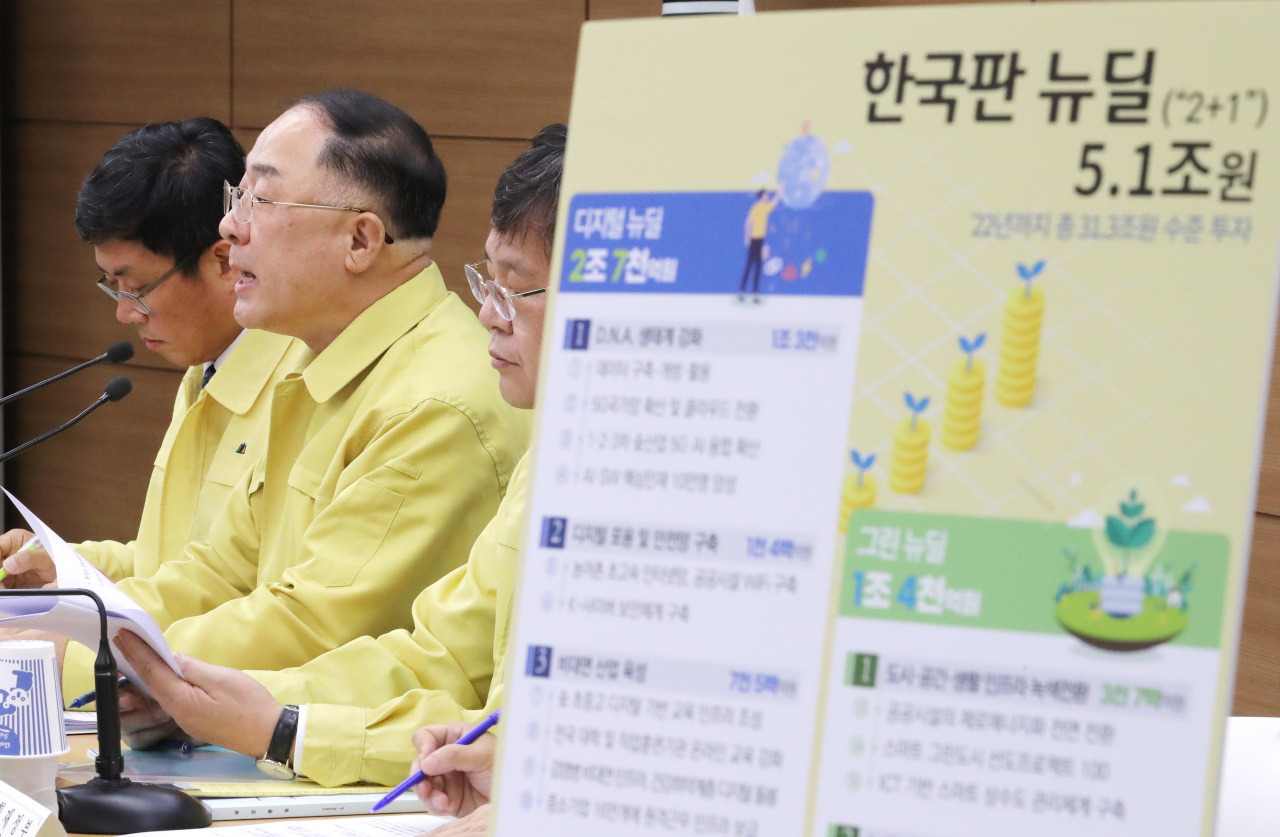S. Korea proposes largest-ever extra budget to battle pandemic
By YonhapPublished : June 3, 2020 - 10:09

SEJONG -- South Korea on Wednesday proposed another extra budget plan worth 35.3 trillion won ($29 billion) that will help key industries cushion the economic blow from the coronavirus pandemic and protect jobs.
The biggest-ever budget, which is subject to approval from the National Assembly, will raise the total of the nation's stimulus packages to 270 trillion won as the government has stepped up fiscal and monetary responses to the pandemic, according to the Ministry of Economy and Finance.
The third budget follows a second supplementary budget worth 12.2 trillion won in April to fund emergency handouts for households and the first one totaling 11.7 trillion won in March to cope with the economic impact of the coronavirus outbreak.
It was the first time in 48 years that South Korea drew up a third extra budget in a year, the ministry said.
If the bill is approved by the parliament, the government will spend more than 75 percent of the extra budget within three months, the ministry said.
Addressing a tax revenue shortfall and tax cuts makes up 11.4 trillion won of the third budget, and another 11.3 trillion won is earmarked to revive economic recovery, according to the ministry.
Some 5.1 trillion won will be set aside for a "Korean-version New Deal" project, which will boost state spending on artificial intelligence and fifth-generation telecommunications services, it added.
About 9.4 trillion won will go for subsidies to strengthen social safety nets for people who recently lost jobs and create about 550,000 jobs.
As much as 5 trillion won will be spent to provide emergency loans to small merchants who have struggled with falling revenues over the pandemic.
To fund the third budget, the government will issue 23.8 trillion won in state bonds. The remaining 11.5 trillion won will be funded by readjustments of the government's spending.
Finance Minister Hong Nam-ki told reporters that the third extra budget will play a significant role for the nation to boost economic growth and create jobs when the pandemic wanes.
"I believe that this extra budget will become a valuable foundation for the nation to create new growth engines in the post-coronavirus era," Hong said.
Hong said the government will submit the extra budget bill to the National Assembly on Thursday, urging lawmakers to swiftly approve the bill.
"As the effectiveness of an extra budget depends on its speed and timing, utmost efforts are urged to cooperate so that the National Assembly can pass the third extra budget this month," Hong said.
South Korea has pledged to keep an aggressive fiscal policy to fight the pandemic, which will push up the debt-to-GDP ratio to 43.5 percent this year, compared with some 40 percent before the virus crisis.
However, Hong said the nation must endure a rise in the debt-to-GDP ratio because it could swiftly help reinvigorate the economy.
"Facing an emergency economic situation, we can't make light of the fiscal role that is desperately needed," Hong said.
The government will sell deficit-financing bonds to fund the budget, but the Bank of Korea is expected to buy a "significant amount" of the bonds, Hong said, adding that the deficit-covering bonds are likely to have a limited impact on the bond market.
The third extra budget aims to provide more spending on helping revive consumption and exports in the second half, Hong said. In April, South Korea suffered its biggest monthly job losses in 21 years as the coronavirus outbreak and containment measures hammered the economy.
The number of employed people in South Korea stood at 26.56 million in April, 476,000 people fewer than a year ago, marking the biggest on-year decline since February 1999.
South Korea's export-reliant economy is expected to suffer a bigger hit from the pandemic as the novel coronavirus disrupted global businesses and ravaged consumer demand.
Exports dropped for the third consecutive month in May due to the growing economic fallout from the pandemic. Outbound shipments dipped 23.7 percent to hit $34.8 billion last month, compared with $45.7 billion posted a year earlier.
Last week, the Bank of Korea (BOK) predicted that the nation's economy will contract 0.2 percent this year, a steep downgrade from the 2.1 percent growth it had forecast in February.
The latest forecast would mark the biggest contraction since 1998, when the nation's economy was hit by the Asian financial crisis.
To shore up the virus-hit economy, the BOK slashed its policy rate by a quarter percentage point to a record low of 0.50 percent.
The finance ministry painted a less gloomy picture for this year's economic growth, expecting Asia's fourth-largest economy to grow 0.1 percent this year, although it is a sharp cut from the 2.4 percent growth the ministry had predicted last December and would mark the lowest growth in about two decades.
Still, the ministry's latest forecast is higher than projections by other agencies.
In a bleaker outlook, the International Monetary Fund (IMF) has predicted that South Korea's economy will contract 1.2 percent this year.
The IMF predicted the global economy will shrink 3 percent this year, saying the coronavirus pandemic will bring the worst economic pain since the Great Depression of the 1930s.
The Korean economy grew 2 percent last year, the slowest on-year growth since 2009.
The latest extra budget is the sixth under the Moon Jae-in administration.
In 2017, the current administration set aside an extra 11 trillion won to create more jobs and then an additional 3.8 trillion won in 2018 for the same purpose.
Last year, the Moon administration also formed a 6.7 trillion-won supplementary budget to fight fine dust and help the economy. (Yonhap)









![[Kim Seong-kon] Democracy and the future of South Korea](http://res.heraldm.com/phpwas/restmb_idxmake.php?idx=644&simg=/content/image/2024/04/16/20240416050802_0.jpg&u=)








![[KH Explains] Hyundai's full hybrid edge to pay off amid slow transition to pure EVs](http://res.heraldm.com/phpwas/restmb_idxmake.php?idx=652&simg=/content/image/2024/04/18/20240418050645_0.jpg&u=20240418181020)

![[Today’s K-pop] Zico drops snippet of collaboration with Jennie](http://res.heraldm.com/phpwas/restmb_idxmake.php?idx=642&simg=/content/image/2024/04/18/20240418050702_0.jpg&u=)